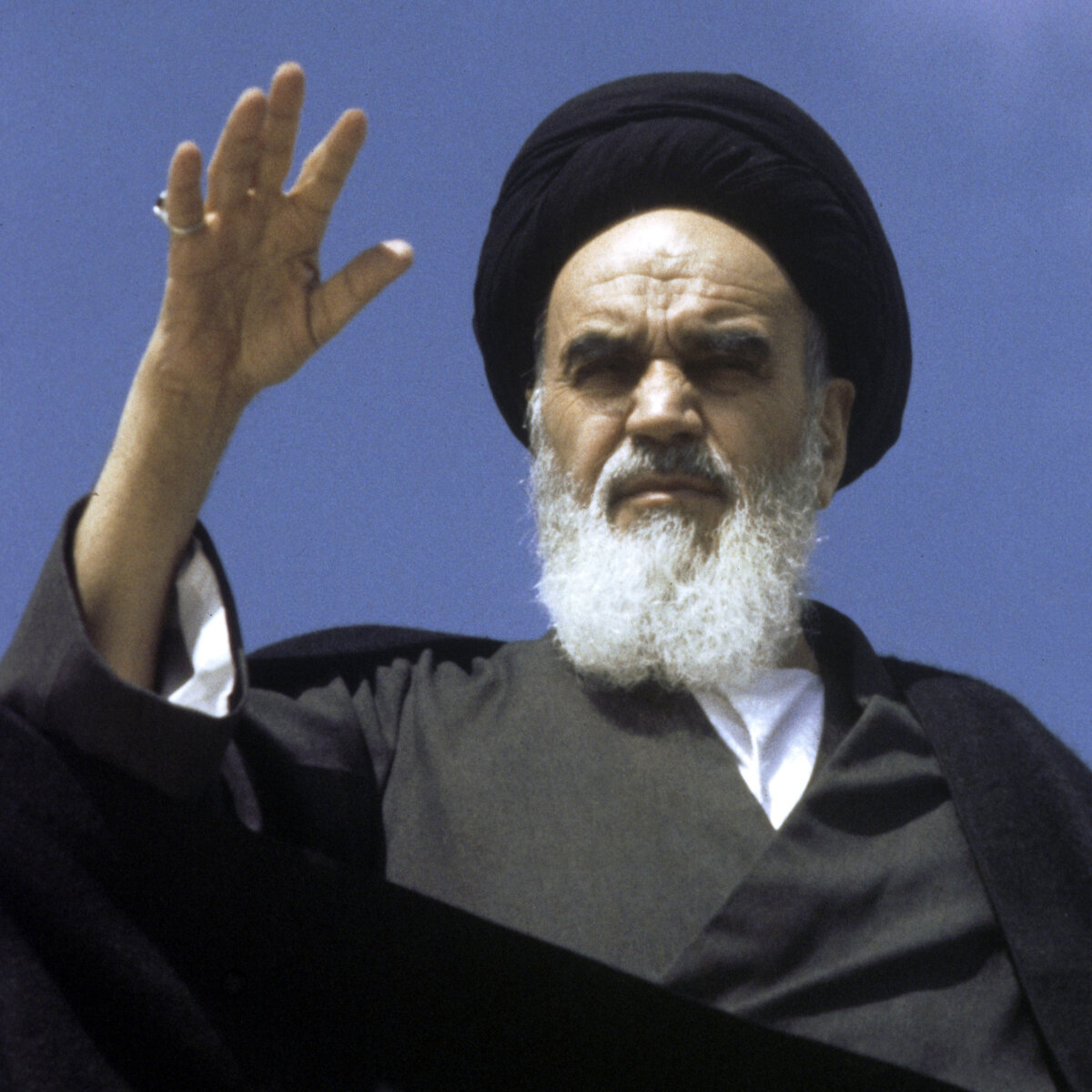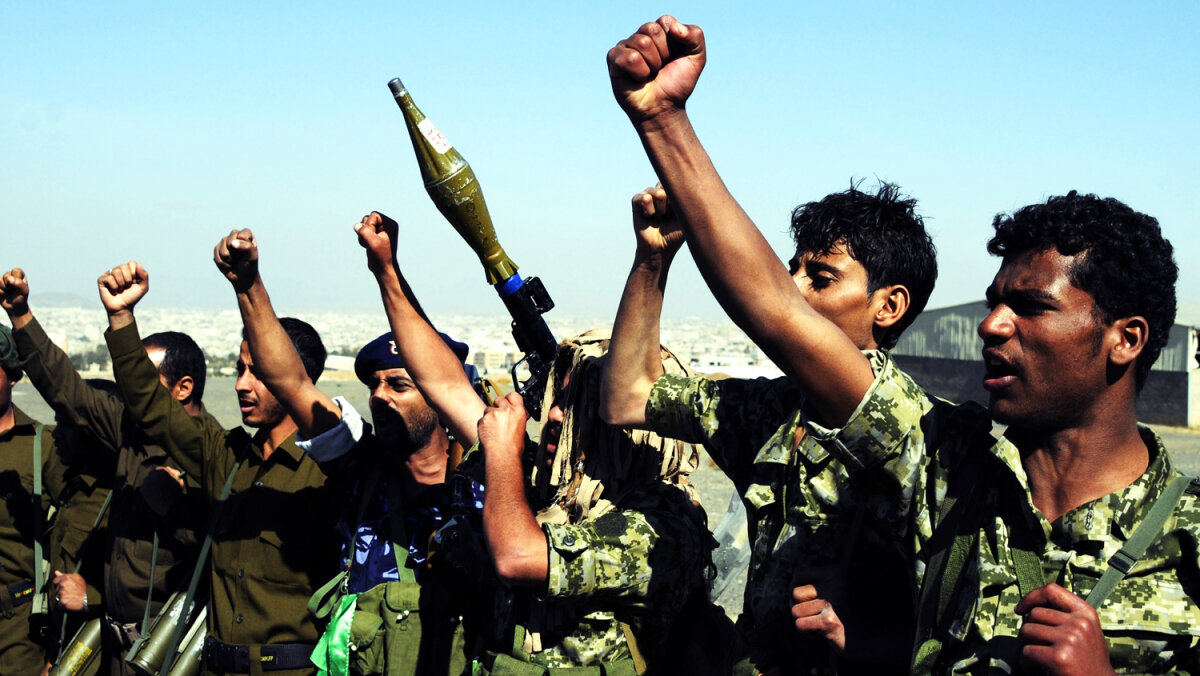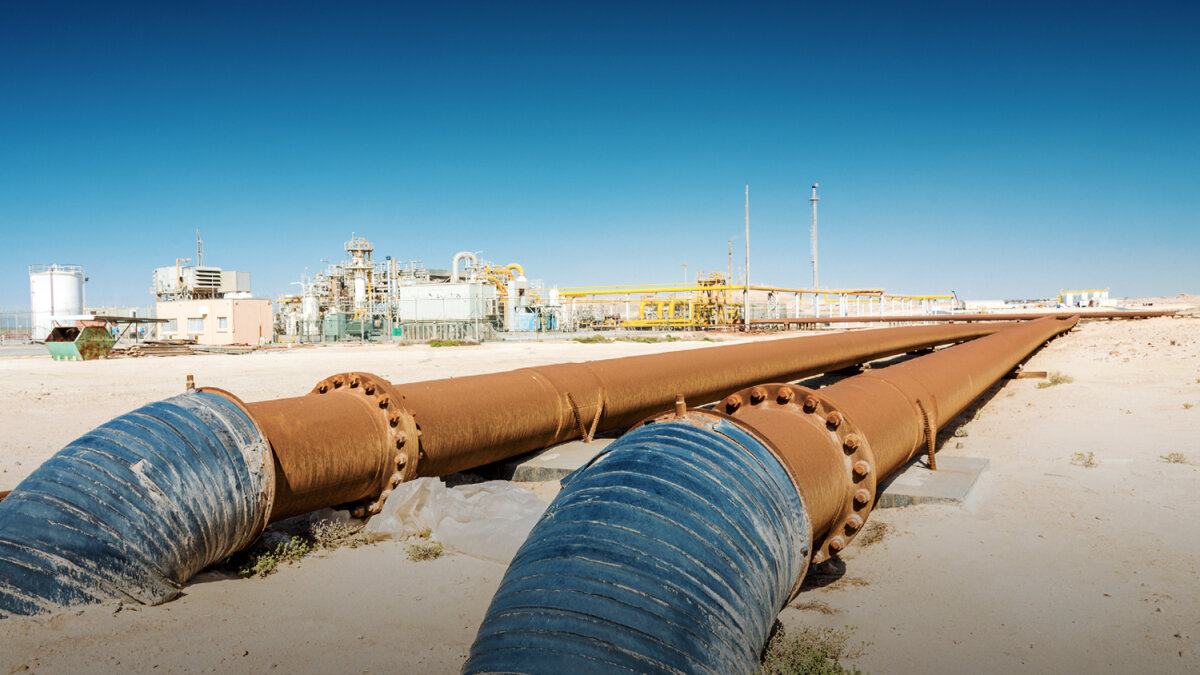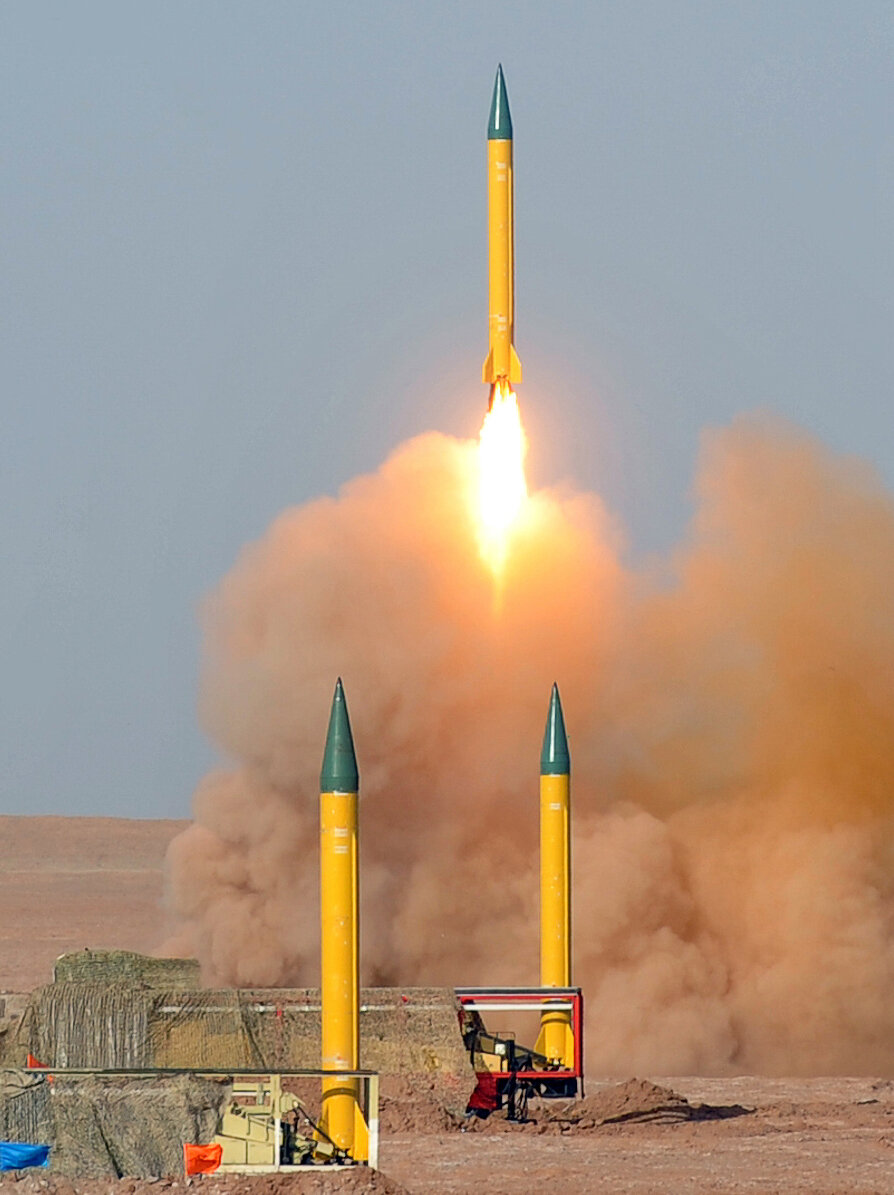‘Iran Is Targeting All of Us’

“We shall export our revolution to the whole world,” the late Iranian Supreme Leader Ayatollah Ruhollah Khomeini brazenly declared following the Islamic Revolution of 1979. “Until the cry ‘There is no god but Allah’ resounds over the whole world, there will be struggle.”
The struggle continues to this day, and it is greatly manifest in Iran’s pursuit of nuclear weapons and ballistic missiles, as well as in its much-publicized proxy war against a Saudi Arabian-led coalition of Arab nations.
The Houthi Assault
Iran’s proxy war with Saudi Arabia in Yemen began in March 2015, when the Saudis assembled a coalition of 10 Middle Eastern and North African nations to fight Iranian-sponsored Houthi rebels, who had deposed the Yemeni government and seized the capital of Sana’a six months earlier. Nations such as the United States, Britain, France, Canada, Turkey, China and Germany provided the Saudi coalition with arms and logistical support.
On Nov. 4, 2017, after months of fighting and missile attacks in both directions, Houthi rebels in Yemen fired their most potent ballistic missile when they targeted the predominantly civilian King Khalid International Airport in the Saudi Arabian capital of Riyadh.
The Burqan 2H missile traveled some 600 miles from Yemen’s northern border before the Saudi military’s antimissile defense system intercepted it midflight. Saudi authorities said the missile was made in Iran, disassembled and smuggled into Yemen, and reassembled in Yemen by operatives from Iran’s Islamic Revolutionary Guard Corps (irgc) and its Lebanese-based proxy Hezbollah.
That was the first time that the Houthis had fired a missile at the heart of Saudi Arabia. The Saudis considered it to be “direct military aggression by the Iranian regime” and “an act of war against the kingdom.” The U.S. considered it a gross violation by Iran of two United Nations Security Council (unsc) resolutions on the Yemen crisis and Iran’s missile program.

On December 19, the Houthis fired yet another missile toward Riyadh. Their intended target was the al-Yamamah royal palace in southern Riyadh, where Saudi Arabia’s King Salman typically meets with government officials each week and visits with world leaders on occasion. Again, the Saudis safely intercepted the missile. Houthi leaders said they used a Volcano 2H missile to target a “top leadership” meeting at the palace. Haaretz paraphrased the Iranian-sponsored Houthi rebels as saying that the missile strike signaled “a new chapter in the confrontation with Saudi Arabia” and that “Saudi palaces, as well as military and oil facilities, are within range of their missiles.”
Four months earlier, on August 1, Bruce Riedel, director of the Intelligence Project at the Brookings Institution, observed:
Iran is gradually increasing its support for the Houthi rebels in Yemen. Rather than eliminating the Iranian presence in the country, the Saudi-led war is giving Tehran the opportunity to become more influential there than ever. The Houthis … will need Tehran’s backing more as the stalemate continues. … A war designed to weaken Iran is actually helping it against its regional rival.
To make matters worse, the Saudi coalition has conducted “scores of unlawful attacks” that have killed “many, many, many civilians” in Yemen, as a Human Rights Watch spokesperson asserted. The corollary humanitarian crisis in Yemen—the world’s worst—is actually weakening and discrediting the Saudis and distracting the world from Iranian exploits in the country that once was the only democratic nation on the Arabian Peninsula.
Back in September 2014, when the Iranian-backed Houthi rebels overthrew the Yemeni government and conquered the capital city, an Iranian member of parliament with close ties to Supreme Leader Ayatollah Ali Khamenei was quoted by the state’s Rasa News Agency as saying, “Three Arab capitals [Beirut, Damascus and Baghdad] have today ended up in the hands of Iran and belong to the Islamic Iranian revolution.” He reportedly boasted that the fourth was Sana’a.
This means that Iranian leaders do not actually need to be the ones pushing the buttons to launch ballistic missiles or storming into Middle Eastern capitals and overthrowing governments. As long as their proxies or affiliates, like the Houthis in Yemen, are doing that, then no matter how self-serving or nationalistic their motivations might be, they ultimately are helping Iran’s mullahs in furthering the Islamic Iranian revolution.
The Bahrain Pipeline Explosion
On November 10, barely a week after the Riyadh attack, an explosion blasted a major oil pipeline in a small village in Bahrain and filled the night sky with flames and fumes. According to the Bahraini Interior Ministry, the blast was an “act of sabotage and a dangerous act of terrorism” that was “carried out through direct contacts and instructions from Iran.”
The explosion occurred about eight miles southeast of the Bahraini capital of Manama. It engulfed vehicles and nearby buildings and forced authorities to temporarily evacuate residents near the site.
For two days, the pipeline stopped delivering the daily 230,000 barrels of oil from neighboring Saudi Arabia. Bahraini Foreign Minister Sheikh Khaled bin Ahmed wrote on Twitter that “the attempt to bomb the Saudi-Bahraini oil pipeline is a dangerous Iranian escalation that aims to scare citizens and hurt the global oil industry.”

He added, “Iran is targeting us all.”
Historically, Iran has wielded heavy influence in Bahrain and claimed sovereignty over the island nation. In 1970, Iran renounced its claims following a pro-independence referendum in Bahrain. But the Iran that emerged from the Iranian Revolution of 1979 refused to recognize that renunciation. To this day, its leaders consider Bahrain to be “an Iranian province that was detached from the Islamic Republic of Iran due to the Western colonialism.” For this reason, they say, Iran “must make efforts to bring Bahrain back into Iranian territory and transform it into a part of [its southwestern province of Bushehr].” Iranian operatives have funded and armed Shiite militants in Bahrain to this end. They have even trained them in bomb-making and guerrilla warfare.
Bahrain, like Iraq under Saddam Hussein, has a Shiite majority ruled by a Sunni minority. Simply put, it appears that in Bahrain, Iran wants to create another Iraq in the Middle East: a Shiite majority nation ruled by Shiites and loyal to Iran.
Three days after the pipeline explosion, lawmakers in Bahrain issued a statement linking the incident to the November 4 Riyadh attack and to other examples of “Iranian meddling in the region.”
Some analysts linked the pipeline incident in Bahrain to a different battlefield in the Iran-Saudi proxy war. ihs Markit wrote that “it is more likely than not that Iran chose [the Bahrain attack] as a plausibly deniable response to Saudi Arabia’s perceived recent escalation against Iranian influence in Lebanon.”
The Washington Institute for Near East Policy’s Simon Henderson cautioned on November 14: “In the Gulf region as a whole—still the most important source of oil for the world economy—all oil and gas installations are vulnerable to sabotage and particularly military attack. The Bahrain pipeline incident should be a wake-up call for all players not to take comparative calm—and consequent low prices—for granted.”
Threats Against American Bases
When the United States threatened to impose new sanctions on Iran for noncompliance with the Joint Comprehensive Plan of Action (jcpoa) nuclear deal, Iran responded with threats of its own.
“[I]f the U.S. new sanctions act comes into action, the [U.S.] should transfer its regional bases to 2,000 kilometers [1,200 miles] away, that is as far as the range of Iranian missiles,” threatened irgc Maj. Gen. Mohammed Ali Jafari on October 8. Three weeks later, on October 31, he warned that any new sanctions “will increase the Iranian nation’s determination to increase its defense and missile power and [the U.S.] will see an increase in the range and precision-striking power of missiles.”

“Based on the policies specified by [Khamenei], the range of our missiles is limited to 2,000 kilometers,” Jafari said. “[B]ut we have the capability to increase the range.”
Iran’s continued ballistic missile program is in direct violation of unsc Resolution 2231. While it currently is not a technical violation of the nuclear deal, the illegal missile program will violate the jcpoa the moment Iran mounts nuclear warheads on its arsenal of missiles.
Many observers warn that the nuclear deal has not placated Iran. Quite the contrary, as U.S. Rep. Ron DeSantis told the Washington Free Beacon, “Iran’s behavior … has only seemed to get worse. … The present course is untenable and Iran’s threatening behavior is likely to increase in frequency.”
Iran could attack a U.S. base, either directly or via proxies. It has done so before. In 1983, Iranian-sponsored terrorists conducted the worst attack on U.S. Marines since World War ii by killing 241 American servicemen at barracks in Lebanon. It was largely because of that attack that the U.S. officially designated Iran a state sponsor of terrorism. And its terrorism has not relented since.
America’s Naval Support Activity Bahrain is home to the U.S. 5th Fleet. Not only is it well within the 1,200-mile radius, it is a mere seven miles from the pipeline explosion site. That base, as the Washington Institute noted, has been “a crucial component in deterring Iranian naval aggression,” and Iran might have instigated the attack to make good on its threats (op cit).
Threats Against European Nations
One of the likeliest responses from the U.S. is that leaders like Representative DeSantis will ask “Congress to proceed with additional secondary sanctions,” and perhaps not much more.
Following Iran’s threats against U.S. bases, Adrian Rankine-Galloway, a spokesman for the U.S. Department of Defense, said the United States was “reviewing the entire breadth of our security cooperation activities, force posture, and plans” and “identifying new areas where we will work with allies to put pressure on the Iranian regime, neutralize its destabilizing influences, and constrain its aggressive power projection, particularly its support for terrorist groups and militants.”
Another likely response is that the U.S., as Rankine-Galloway indicated, will use its allies to exert pressure on Iran.
Europe, particularly France, appears to be doing just that.
On November 15, a spokesperson for the French Foreign Ministry said her nation was “concerned about the continued pace of the Iranian missile program, which does not conform with Security Council Resolution 2231 and which is a source of destabilization and insecurity for the region.” She added:
France wishes to examine all the diplomatic options: a frank and uncompromising political dialogue with Iran; investigations by the UN general secretariat; if necessary, new European sanctions against Iranian entities or individuals involved in the ballistic program; and finally opening a negotiation on the subject.
On December 12, French Foreign Minister Jean-Yves Le Drian said his nation would not allow “the Iranian presence and the desire to make an axis from the Mediterranean to Tehran.”
Most of Europe’s current leaders would rather take a more cautious approach in dealing with Iran. Reuters reported that the administration of newly elected French President Emmanuel Macron was pursuing a “tough line” on Iran’s missile program, “despite EU caution.”
These leaders are exercising caution even in their efforts to preserve the jcpoa nuclear deal with Iran. But they aren’t doing so because they trust Iran or because they want it to go nuclear; they are doing so because they distrust and fear this belligerent Iran so much that they choose appeasement rather than confrontation. But their idealist school of thought will not solve the problem.
This mindset likely explains why Europe’s current leadership is seemingly at odds with some intelligence organizations in Europe, which have condemned the nuclear deal and sounded alarms about Iran. One report from the German state of Saxony-Anhalt said Iran “is working on its missile program unabated” (Trumpet translation). “With ballistic medium- and long-range missiles, it will not only be able to threaten Europe,” but other regions as well.
Europe’s stance on Iran could easily and dramatically reverse with a change in leadership, and France appears to be proving the point powerfully.
Iranian leaders, however, have responded to France’s diplomatic threats with military threats.
On November 25, a senior leader of the irgc warned that his nation could easily upgrade its ballistic missiles to strike targets anywhere in Europe.
“So far, we have felt that Europe is not a threat, so we did not increase the range of our missiles,” Fars News Agency quoted Brig. Gen. Hossein Salami as saying. “But if Europe wants to turn into a threat, we will increase the range of our missiles.”
According to Fars News Agency, Salami said Iran had been maintaining the 2,000-kilometer limit as a matter of “strategic doctrine.” He said:
[T]he United States and the European Union and [Israel] are keen to disarm us. … We tell the European countries that if we have confined the range of our missiles to 2,000 kilometers until today and have not increased it any further, it is not because of a lack of technology, because we have no limitations for the range of our missiles in technological terms.
This development calls to mind a declaration from the late Khomeini on Feb. 1, 1979: “We must settle our accounts with great and superpowers and show them that we can take on the whole world ideologically, despite all the painful problems that face us.”
It is prophetically significant.
The Trumpet has been vigilant in watching Iran expand its power to fulfill its end-time role as “the king of the south.” We have particularly watched Iran’s proxy wars with Saudi Arabia, and we have watched its growing aggression against the U.S. (which its leaders call “the Great Satan”) and against Israel (which its leaders dub “the Little Satan”). But we have especially watched Iran’s growing aggression against Europe.
For centuries, Europe has battled the forces of radical Islam originating from the Middle East, just a little over 2,000 kilometers away. While some of Europe’s current leaders appear less confrontational against Iran, the atmosphere is changing.
Bible prophecy describes one final clash between a European “king of the north” and a Middle Eastern “king of the south” in Daniel 11:40: “And at the time of the end shall the king of the south push at him: and the king of the north shall come against him like a whirlwind, with chariots, and with horsemen, and with many ships; and he shall enter into the countries, and shall overflow and pass over.”
Iranian missiles can currently reach as far west as Lithuania, Poland, Slovakia, Hungary, Croatia, Bosnia and Herzegovina, and southern Italy. Unlike with U.S. bases, relocating these nations beyond Iran’s ballistic missile range is obviously not an option. If Iran extends its missile range beyond the 2,000-kilometer radius, the core nations of Europe would be left with no option but to react in such a way as to fulfill Bible prophecy in dramatic fashion.
In the introduction to his booklet The King of the South, Trumpet editor in chief Gerald Flurry writes: “The king of the north and the king of the south are two powers prophesied to clash in this end time. … Both powers are rising fast on the world scene right now.
Mr. Flurry then goes through a study of the Hebrew words in the Daniel 11 prophecy to show the militaristic nature of the “push” and the “whirlwind” response.
He writes later in the booklet:
The king of the north is comprised of several nations, led by one nation, Germany. … All indications point to Iran as the nation that produces the king of the south. Since the early 1990s, we have believed and taught that Iran would lead the radical Islamist world and be the king of the south. Today Iran is “king” in the Middle East.
Mr. Flurry first published The King of the South in 1996. He last updated it in 2016, detailing how virtually every major news headline in the Middle East over the years has substantiated Bible prophecies about Iran’s aggressive, pushy nature.
Request your free copy of The King of the South and understand why Iran features in so many headlines.
